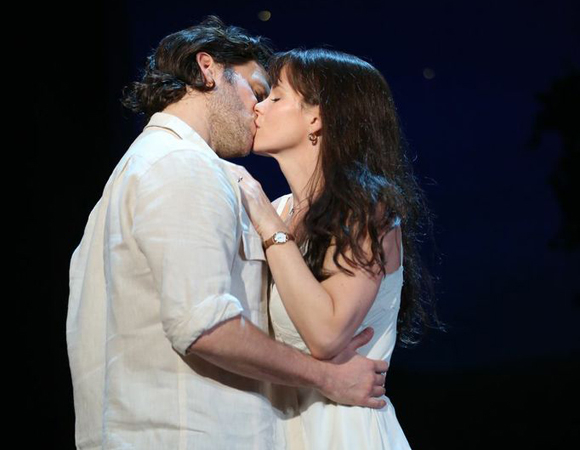The Bridges of Madison County

(© Joan Marcus)
One of the perks of attending theater over the course of many years is the chance to watch a performer grow into his or her talents. In the nearly 15 years since Kelli O’Hara first graced Broadway, as a replacement in the original production of Jekyll & Hyde, audiences have seen her morph from talented supporting player to luminous leading lady, racking up several award nominations. Now, in Jason Robert Brown and Marsha Norman’s musicalization of Robert James Waller’s novel The Bridges of Madison County, we’re privileged to see O’Hara take one more step toward to the throne of genuine, bona fide star.
It helps that O’Hara is in a terrific new musical, featuring an elegantly adapted book by Norman (who did similar duties on The Color Purple and The Secret Garden) and a lush, tailor-made score by Brown, the man behind The Last Five Years and Parade. It also helps that Bartlett Sher, who directed her in The Light in the Piazza and South Pacific, has staged a near-perfect, attractively designed production, in addition to providing O’Hara with a ruggedly handsome costar in Steven Pasquale, making his Broadway musical debut in a fashion that will set the bar very high in the future.
O’Hara and Pasquale play Francesca Johnson and Robert Kincaid, two lonely people from vastly different worlds brought together on a sultry afternoon by a twist of fate. Robert, the globetrotting ace photographer for National Geographic, is on assignment in Winterset, Iowa to shoot the covered bridges of Madison County. On the hunt for the illusive Roseman Bridge, he drives up to an unassuming farmhouse where Italian-born Francesca Johnson is alone on this particular day after her husband, Bud (Hunter Foster), and their children, Michael and Carolyn (Derek Klena and Caitlin Kinnunen), have departed for the state fair. Francesca’s decision to provide Robert with directions, and later cook him dinner, sets the pair on a four-day love affair so powerful it changes their lives.
If you're familiar with Waller's bestselling novella or the 1992 Meryl Streep-Clint Eastwood film, know that the property is frequently met by negative criticism for its over-the-top sentimentality. And though toward the end of the stage version you will find yourself tearing up, this is not because Brown and Norman use the novella’s standard love-and-loss-story archetypes to play on your feelings. Rather, what they produce through the hopefulness of Norman's book and Brown's impeccably crafted, lust-and-longing-filled score hits home because of their recognizable humanity.
Those aspects are not only visible in the material, they're also blissfully present in all of the performances. You can see it in the eyes of Bud, one of many characters Norman fleshes out more fully than Waller had, and Foster imbues the dour farmer with more depth and a sense of inner conflict that the novella doesn't contain. Similarly, Norman provides a discernible personality for Francesca as well as Bud's children, believably played by Klena and Kinnunen, as well as the nosy neighbor Marge (played to the hilt by Cass Morgan) and her sarcastic husband, Charlie (Michael X. Martin, hilariously deadpan). And in a brilliant theatrical realization of a character the novel only mentions in passing, Whitney Bashor takes on the role of Marian, Robert's folk-singer ex-wife. Brown provides her with an extraordinarily beautiful song called "Another Life", which acutely echoes her and Robert's failures and the future that Robert and Francesca could have together.
When O'Hara and Pasquale sing together, they not only elevate The Bridges of Madison County to an even higher emotional plane, but you can see the layers of world weariness disappear as they fall deeper and deeper in love. They dazzle in their second act duet, "Before and After You/One Second & a Million Miles," and both have a chance to nearly stop the show, the marvelous O'Hara with the jaw-dropping aria "Almost Real" and Pasquale with his eleven-o'clock number, "It All Fades Away." Brown's score provides the pair with an embarrassment of riches and Tony winner Brown manages to top himself with each successive song.
Sher's staging deftly brings the material to life, weaving together past, present, and future through Michael Yeargan's wide-open set (however, placing his actors on either side of the stage to watch the action is a bit too on the nose for a show with such graceful subtlety). Time and place are conveyed through Donald Holder's lighting, which subtly shifts in color and tone to symbolize daybreak and sunset. Catherine Zuber's appropriately plain costumes and David Brian Brown's wigs turn the youthful, blonde O'Hara into a believable older brunette with a pair of teenage children. And through Jon Weston's impeccable sound design, you can hear every single instrument, from the forlorn cello to the riffing piano, giving crystal clarity to Brown's stunning orchestrations.
In considering Brown and Norman's efforts to bring The Bridges of Madison County to the stage of the Schoenfeld Theatre, one realizes how the final product is so unlike musicals being written and produced today. As in the shows of yore, there are no bells and whistles, no flying this or falling that. The songs surface when mere speaking doesn't suffice. One can only imagine that the feeling onlookers have as Francesca and Robert fall in love is akin to that of 1945 audiences when Billy Bigelow and Julie Jordan first sat on a bench and changed the face of musical theater.











